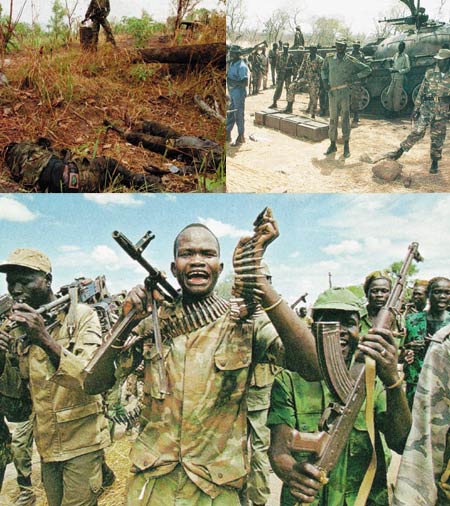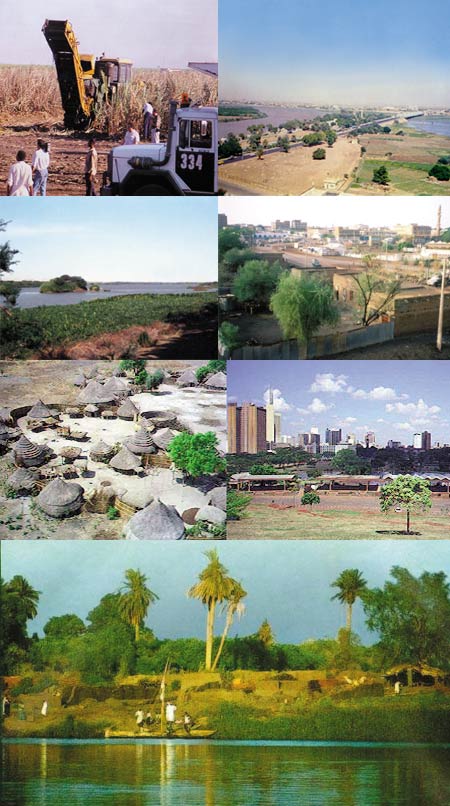 |
One of the country's most important problems is the longstanding conflict between its north and south. This conflict is both religious and ethnic in nature. Muslim Arabs live in the north, whereas Christian Africans form the majority in the south. This ethnic and religious split is a legacy of the British colonial administration that drew up the frontiers of the country. The legacy is a bloody one. Ever since the 1960s, the southern Christians have been in a state of organized rebellion against the Khartoum administration run by the Muslim Arabs in the north. This rebellion is organized by a Christian organization calling itself the "Anya-Nya."
In 1989, the rebellion in the south gathered momentum with the establishment of a Muslim regime in the country. That is because "some people" constantly incite rebellion against the administration in Khartoum.
 |
As can be imagined, Israel heads the list of those backing the Anya-Nya uprising. In his book The Israeli Connection, Benjamin Beit-Hallahmi reveals that Israel has supported the southern rebels since the 1960s. Ever since that time, Israel has given the Anya-Nya movement arms and military training. Israeli intelligence organization the Mossad established links with the southern rebels via its stations in Uganda, Chad, Ethiopia and the Congo, and some 30 Anya-Nya guerrillas were given special training at Mossad headquarters in the city of Torit. In 1970 Israel reached an agreement with Uganda, to the south of Sudan, thus expanding its ability to use the Uganda-Sudan border and to support Anya-Nya. According to the mercenary Rolf Steiner, who fought with the Anya-Nya, Israel was the southern rebels' most important backer.45
Sudan went through a period of political upheaval until 1989, when the Muslim Brotherhood organization led by Hasan al-Turabi took over the administration. Since then, there has been an Islamic state in the country, led by al-Turabi. Following the introduction of Islamic laws by the Sudanese Parliament, the Anya-Nya began a new uprising, under the name of the Sudan People's Liberation Army (SPLA). Before sitting down to negotiate with the administration, SPLA leader John Garang laid down as a precondition the revocation of Islamic laws. When the parliament refused to accept this, the violence increased. This uprising against the Islamic regime was supported by a number of countries.
Once again, the most important of these was Israel. Dr. Ahmed Abdel-Halim, the Sudanese ambassador to Egypt, told the Egyptian Al-Ahram Weekly that, "The (SPLA) gains on the battlefront are primarily due to Israeli and Eritrean military assistance."46 Facts that emerged over time revealed that Israel was the real source of the Christian rebels' arms, smuggled in by the Protestant and Catholic churches hidden in coffins.
Yet the United States declared Sudan to be a terrorist state in August 1993, although it had no concrete proof. Following that, economic sanctions were imposed, IMF and World Bank aid was cut off, and an arms embargo was imposed on the region. Food aid for Sudan was also cut off. The pictures show Christian rebels in southern Sudan.
There is currently a war raging against the present administration in Sudan. This war has two separate dimensions: One is the hunger ploy, and the other the concept of "terrorist states."
From the point of view of its natural resources, Sudan is actually a quite wealthy nation. There are uranium, gold and oil reserves, and the land is very fertile. Yet because of the civil war of recent years, Sudan is currently very impoverished.
Anti-Islamic Forces Support Separatists in Southern Sudan |
 |
| Another claim made by the United States when it declared Sudan to be a "terrorist state" was that of human rights violations in the south of the country. What was really happening, however, was a struggle being waged against the violent actions perpetrated by rebels opposed to the Islamic regime. The rebels are still waging their fight with support from the West, and despite a statement from President al-Bashir that the rebels would be allowed to go if they gave up their arms, all calls for peace have been ignored. |
Despite all its troubles, however, Sudan took a serious step in the direction of redevelopment with the coming to power of a regime in 1989. That administration, led by Sorbonne graduate Hasan al-Turabi with the slogan "Religion is the true engine of progress," made thousands of hectares of agricultural land arable again. Two major dam projects on the river Nile were initiated to use Sudan's rich water resources for the irrigation of 1.5 million acres along its banks and to make Sudan a major electricity-producing country. However, the country was unable to sell what it produced as a result of these efforts because it was branded a "terrorist nation" by obvious circles as well as the subsequent economic embargo placed on it.
 |
| Separatist guerrillas supported by Israel. |
In this way, development in Sudan was and is still being prevented. On the other hand, the Western press frequently carries news reports of starvation in Sudan. The only region of the country experiencing hunger is in fact certain parts of the south, itself in revolt against the central authority.
The main aim behind these reports is this: Firstly to portray the government as responsible by engaging in propaganda about "famine in the Sudan," and then to try to gain influence in the country by saying that humanitarian aid is being supplied to the starving people of the country. Of course the sending of humanitarian aid to the people of Sudan is an important humane duty, and one which should be supported. Yet events generally show that such aid does not reach its intended destination or that such initiatives are not being taken with help in mind. The fact that the aid sent is of poor quality and unfitted to the task at hand is an important indication of this. Those who have seen this aid in its original place say that the food is of such poor quality that it is fit only for animals. One observer reported the following:
 |
| Fully 83 percent of the 25 million population of Sudan are Muslim, with 10 percent animist and 7 percent Christian. The animists and Christians live in the south and the Muslims in the north. The fertile land in the north disproves the propaganda claims that "there is famine in Sudan." |
I saw with my own eyes the wheat that was sent to Sudan as food aid. The Sudanese government decided to feed its livestock with this wheat both because it was past its expiration date and was of very poor quality besides. I wonder what ...would .... be done with this wheat had it not been sent to Sudan? I believe they would have either destroyed it or fed it to their own animals. This is the truth behind the aid sent by the ... other Western countries, aid which is constantly used as fodder for propaganda. Sudan's new government is no longer knocking on the door of the oppressive countries and asking them for food aid.47
On the other hand, propaganda to the effect that Sudan is a "terrorist state" and supports terrorism still goes on. This is certainly a serious accusation that needs to be investigated. It is entirely natural that great sensitivity should be shown in matters such as terrorism that concern peoples' security. Yet no measure must be taken in the name of preventing terrorism that could lead to people who have nothing to do with terrorism being harmed in any way. The measures taken can only succeed to the extent to which they establish peace and justice. So there must be no departure from the dictates of good conscience.
*As has frequently been stressed throughout this book, the sole cause of what is occurring in Sudan is the country's strong Islamic belief. However, in fact the government of Omar Hassan al-Bashir, which came to power after al-Turabi, is taking various steps in line with the wishes of the West and the fact that Al-Bashir, who is accused of importing Arab nationalism into the Sudan, wishes to arrest a figure like al-Turabi who enjoyed the support of all Muslim countries is a sign that unwelcome developments are taking place in the country.
45- Benjamin Beit Hallahmi, The Israeli Connection: Who Israel Arms and Why, Pantheon Books, 1987, pp. 47-49 
46- Al Ahram Weekly, 10-16 October, 2002, issue no. 607 (http://weekly.ahram.org.eg/2002/607/re4.htm) (emphasis added). 
47- Ahmet Varol, Islam Dunyasından Kesitler 3, (Cross section of Islamic World 3), Seha Publications, Istanbul, 1992, p.151 